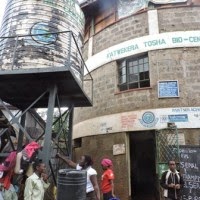Period Poverty Enhanced during COVID-19 and the Closing of Schools
09 March 2021 --- by Jenny Jecrois
Anyone that menstruates requires sanitary products and access to hygienic facilities. However, young girls and women are ripped away from the opportunity to safely and comfortably manage their menses, this is called period poverty.
Schools are back in session in Kenya after a nine-month shut down as a result of the Covid-19 pandemic. Thousands of learners have failed to return back to school which has caused great fear. Many reports from All Africa have presumed that girls aged 10-19 years old have the lowest student turnout due to pregnancies that occurred between January to September 2020. Other learners took jobs in the farming and trade industries, which could also contribute to the small turnout in school attendance according to the same article.
Covid-19 has emphasized scarce hygienic and sanitary products that already existed prior to the global pandemic. Therefore, the low student turn out especially for young women should be no surprise as they greatly need access to hygienic facilities. Global Citizen explains that period poverty is the “lack of access to sanitary products, menstrual hygiene education, toilets, hand washing facilities, and, or, waste management”. Studies have shown that environments that neglect girl’s Menstrual Hygiene Management (MHM) hinders them from attending school. There is an obvious relationship between WASH services provided at schools and student attendance. Young girls that do not attend class are more likely to enter childhood marriages, experience early childhood pregnancies, engage in sex in exchange for money to purchase sanitary products, or fall into domestic violence.
The launch of Kenya’s MHM Policy 2019-2030 and an MHM Strategy 2019-2024 is the starting point for the institutionalization of the issue. It means the allocation of resources, accountability, and provision of standards becomes possible. The MHM policy is akin to the promise of menstrual relief in terms of medication, service, and products. However, the ultimate relief will take a lot of work. “Meeting the hygiene needs of all adolescent girls is a fundamental issue of human rights, dignity, and public health,” Sanjay Wijesekera, former UNICEF Chief of Water, Sanitation and Hygiene said. It’s simple, women and girls have human rights and they also have periods. They shouldn't have to choose one or the other.



I was devastated when I lost access to my crypto wallet containing $297,900 in USDT and Bitcoin. The panic and helplessness were overwhelming until I was referred to Morphohack Cyber Service. Their team of digital forensics and cyber recovery experts quickly stepped in, and to my amazement, they successfully traced and recovered every cent in my wallet.
ReplyDeleteThe entire recovery process took just 72 hours from the moment I first contacted them. Their professionalism, efficiency, and expertise were truly remarkable. I’m incredibly grateful for their help and want to highly recommend Morphohack to anyone facing similar issues with lost or compromised crypto wallets.
They’ve earned a reputation for being credible and reliable, and a quick search will show you that they’ve helped countless others in situations like mine. If you ever find yourself locked out of your crypto wallet or become a victim of crypto loss, don’t hesitate to reach out to them at [Morphohack@cyberservices. com].
Thank you, Morphohack, for your exceptional service!